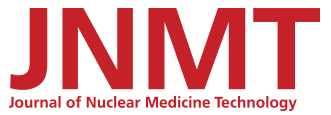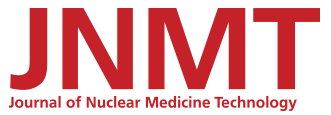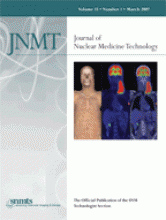INTRODUCTION
The Society of Nuclear Medicine Technologist Section adopted a proposal for the development of a middle level practice provider, designated a nuclear medicine practitioner (NMP), in June 2005. The proposal was compiled with insight from physicians and technologists and culminated with a comprehensive survey of radiologists, nuclear medicine physicians, and cardiologists to assess the possible practice tasks that an NMP might perform. The adoption of the proposal directed that a review of practice scope, knowledge content, and competencies of other lateral middle-level providers, primarily physician assistants (PA), radiologist assistants (RA), and nurse practitioners (NP), and the results of a 2005 SNMTS physician survey be performed to guide the development of practice areas for the NMP (1–3).
NMPs are projected to work in general nuclear medicine settings as well as in specialty settings, such as oncology and cardiology. The scope of practice for the NMP is anticipated to subsume many of the patient care and managerial functions currently provided by a wide array of ancillary personnel and will also include advanced knowledge and skills for practicing nuclear medicine technologist. Additionally, the NMP could assume certain physician tasks under the discretion of the overseeing radiologist or attending physician. Candidates for NMP programs would be credentialed by the Nuclear Medicine Technology Certification Board (NMTCB) or the American Registry of Radiologic Technologists (ARRT) and would have the clinical practice experience deemed appropriate by institutional admissions committees.
COMPETENCY AREAS
The competencies outlined in this document are intended to serve as a guide in the development of the curriculum for NMP programs, which will be offered at the master's degree level. These competencies primarily reflect the clinical tasks of an NMP, but NMPs may take on additional responsibilities at the discretion of the supervising physician. The competency areas were compiled in consideration of tasks required to work with general as well as specific patient populations in diagnostic and therapeutic settings. General competencies are described for general nuclear medicine procedures in all settings, and specialty competences are outlined for cardiology, oncology, therapy, and administration. Elective competencies are those skills in which some NMPs may choose to become proficient depending on their practice setting and the evolution of the profession.
General Core Competencies
-
Obtain patient informed consent for required procedures according to state law and hospital policy.
-
Review requests and physician directives and examine patients prior to procedures as indicated.
-
Perform physical examinations and record patient history relevant to diagnostic and therapeutic testing.
-
Evaluate patient laboratory biochemical markers relevant to pathology (5).
-
Evaluate patient medication and radiopharmaceuticals for testing and contraindication to testing and indicators of patient pathology.
-
Confer with ordering physician to assure appropriate and optimal procedure per pathological indications.
-
Administer radiopharmaceutical for sentinel node imaging and surgical evaluation.
-
Order interventional or sedating pharmaceuticals as indicated by patient profile and diagnostic or therapeutic procedure as allowable by state and federal statutes.
-
Order complimentary diagnostic procedures as indicated by patient testing results.
-
Perform patient bladder catheterizations.
-
Manage through ordering, performance, interpretation or supervision interventions that utilize technological devices to monitor and sustain physiological function.
-
Evaluate images and communicate initial observations as per supervising physician discretion.
-
Record previously communicated initial observations of imaging procedures according to protocol.
Cardiology Competencies
-
Successfully complete Advanced Cardiac Life Support credentialing.
-
Develop procedural policies and standards for cardiac emergencies for department as directed by institutional policy and practice standards.
-
Provide indicated intervention per patient emergent event.
-
Administer cardiac interventional medications as indicated by patient signs and symptoms.
-
Manage crash cart compliance.
-
Take comprehensive patient history and evaluate for patient pathology.
-
Evaluate patient laboratory biochemical markers relevant to cardiac pathology (5).
-
Evaluate patient medication and radiopharmaceuticals for testing and contraindication to testing and indicators of patient pathology.
-
Conduct treadmill testing per all protocol options (4):
Prepare patient for electrocardiography (ECG) testing;
Evaluate ECG tracings for specific pathology and cardiac events; and
Maintain quality control and assurance of ECG equipment.
-
Prescribe and administer interventional drugs for pharmacological stress.
-
Perform frequent evaluation of patient vital signs, and provide intervention for cardiac events, diabetic complications, or other conditions as allowable under state and federal regulations and licensing.
-
Manage and assess cardiac diagnostic imaging procedures.
-
Manage and assess quality control and quality assurance testing on imaging systems and on radiation detection and protection equipment; document for course of use or correction as needed.
Oncology and Therapy Competencies
-
Analyze the indications, contraindications, risk of complications, and cost-benefits of therapeutic interventions (3).
-
Interpret epidemiological data, research, and trends related to incidence and prevalence of cancer (6).
-
Identify risk factors for cancer.
-
Conduct physical examination and take patient history to support diagnostic investigation and disease management.
-
Evaluate appropriate patient selection for therapy through patient history and physical exam (7).
-
Order and interpret complementary diagnostic tests in consultation with physician as allowable by state and federal statutes.
-
Provide post therapy intervention as needed for adverse side effects.
-
Evaluate patient indications for administration of radiotherapeutic agents.
-
Conduct imaging protocols and evaluate images and laboratory values for presence of disease and metastasis (12)
-
Calculate appropriate therapeutic dosage per imaging and laboratory results at the discretion of the supervising physician.
-
Demonstrate appropriate documentation, radiation safety, and radiopharmaceutical administration techniques for radiotherapeutic agents.
-
Prepare patient area for sequestration according to NRC guidelines.
-
Counsel patient for post-administration reduced exposure rates and document compliance.
-
Prepare patients and ancillary equipment for radiation therapy planning using positron and multimodality imaging systems:
Equipment includes masks, therapy planning table, positioning appliances, and other ancillary equipment.
Procedures includes laser positioning and reference marking to maximize radiation therapy goals.
-
Prepare patients for positron and multimodality images for maximum diagnostic quality.
-
Conduct glucose testing and evaluate for appropriate levels for positron imaging, consulting with physician when levels are not suitable for maximum diagnostic quality.
-
Conduct positron imaging and multimodality imaging procedures with demonstration of sound knowledge and performance in all areas of patient preparation, image acquisition and processing, quality control, and management of emergent patient events (8).
-
Conduct recommended quality control, evaluation, and adjustment of computed tomography, positron imaging, and multimodality systems according to protocol.
Administrative Competencies
-
Review and adjust coding practices and procedures to ensure maximum and legal reimbursement.
-
Follow filing and documentation practices for practitioner reimbursement as directed by CMS policies and procedures, state laws, and federal law.
-
Implement compliance changes for all local, state, regional, and federal requirements for laboratory operations and personnel training and credentialing.
-
Conduct procedures and provide documentation for laboratory accreditation.
-
Implement patient safety goals as outlined by the Joint Commission on Accreditation of Healthcare Organizations.
-
Provide tracking and statistical analysis of departmental procedural outcomes per evidence-based practice.
-
Analyze departmental budget and cost/revenue for optimal efficiency.
-
Conduct process for departmental strategic planning per institutional mission.
-
Provide documented analysis and data for resource acquisition.
-
Structure department staffing for quality care delivery and employee satisfaction.
-
Conduct benchmarking analysis and adjust departmental operations for maximum compliance.
-
Conduct patient satisfaction analysis and implement departmental changes as needed for optimal patient care delivery and procedural outcomes.
Elective Competencies
These procedures consist of those tasks that are infrequently performed in most practice settings but might be particularly useful to some NMPs in some settings.
Administer radiopharmaceuticals intrathecally or intraperitoneally using aseptic technique and radiation safety standards at the discretion of the supervising physician.
Participate in image-guided biopsy at the discretion of the supervising physician (13).
Prepare sterile field and prepare biopsy area using aseptic/sterile technique.
Identify appropriate instruments and use according to recommended standards of practice.
Prepare biopsied tissue for pathological examination according to guidelines for specific tissue type.
Close and dress wound according to recommended standards of practice.
Advise patient of needed follow up care.
Manage pain and sedation for patients receiving diagnostic testing or therapeutic treatment (3).
Prescribe pharmacologic and nonpharmacologic interventions as allowable by state and federal statutes.
Monitor patient response to sedation and provide intervention according to accepted standards of practice.







